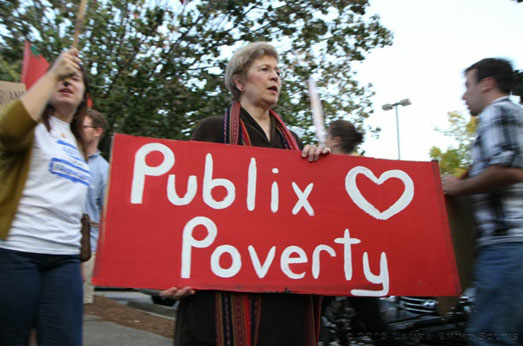[hupso title=”MUST READ: Two great stories on #FairFoodProgram from @SarasotaMagazin & @FoodChainsFilm” url=”https://ciw-online.org/blog/2014/09/lost-in-flood”]

With all the recent news surrounding the Clinton Global Citizen Award and the fast-approaching release of “Food Chains,” some stories just get lost in the flood. However, two such stories from recent days were too good leave behind forever, so we thought we’d take advantage of this brief break in the action to reach back a couple of weeks and share them with you today.
First up is a beautifully written reflection by the Editor of the Sarasota Magazine that brought you last month’s must-read article, “Fairness in the Fields: A Sarasota Organization Brings Hope and Justice to Florida’s Tomato Fields”. The Editor’s piece is part of her monthly “From the Editor” series, previewing what the reader will find in the monthly’s latest edition and adding her thoughts on the topic at hand. This time she chose to focus on the story chronicling the Fair Food Program, and her thoughts are well worth reading. Her column begins:
People are monsters. Selfish, brutal and merciless. And people are heroes. Generous, courageous and just. And that, I’ve come to believe, is as true for every individual as for the species itself. Of course, anyone who follows the news or spends some time with a few kids under 6 (can you guess that my three grandsons are visiting?) has already figured this out. But after reading Phillippe Diederich’s “Fairness in the Fields” in this issue, I’ve been puzzling more than ever over the mysterious dichotomies of the human heart.
Phil’s story is about Sarasota’s Fair Foods Standards Council (FFSC), which occupies a corner office in our building. I didn’t know that—or much else about the four-year-old nonprofit—until recently. And I should have, because the FFSC is the triumphant result of one of the most lopsided battles in American agricultural history: the struggle of a small group of Florida tomato pickers, known as the Coalition of Immokalee Workers, against some of the most powerful corporations on earth. For generations, all across Florida—including in fields close to our elegant coastal city—these workers toiled in conditions that recall pre-Civil War plantations, right down to swaggering overseers who cheated and brutalized them with impunity. For two decades, they fought not only for a modest wage increase, funded by a penny more a pound for tomatoes, but for such basic decencies as clean drinking water and protection from abuse. After their struggle seized the conscience of the nation, some food chains and Florida growers agreed to the penny per pound increase and a humane code of conduct in the fields; and the FFSC was created as an independent auditor to make sure the rules were followed…
And it concludes:
… There are plenty of heroes and villains in this story, and plenty of lessons, too. Simple fairness and social justice are anything but simple; people can find every sort of reason not to change the status quo, especially when money is involved; many of us are not our brothers’ keepers; and absolute power does indeed corrupt. But dark as the human soul can be, the story also shows that sometimes we can and do fight towards the light. Those workers, and all who have supported them, prove that we have the power to repair and remake our world.
Do yourself a favor and read what comes between the beginning and end. It’s really very good stuff. You can find the column in its entirety here.
The second piece is an interview with Food Chains director Sanjay Rawal in the Grace Communications Foundation’s ecocentric blog. The interview, entitled “Heroic Endeavor: Sanjay Rawal’s New Film, Food Chains,” is a thought provoking piece that is touches on a wide range of topics. Here’s an excerpt:
Why do you think Publix has managed to hold out for so long? Do you think they’ll eventually sign?
Publix is a prototype of a modern-day plantation. The surface is shiny and everyone seems to be happy. But look deeper (in this case, look down the supply chain) and a far different reality emerges. Publix claims that the problems of farmworkers are not theirs. As stores become monolithic like Publix, Kroger or Wal-mart, they have an unreasonable effect on their suppliers and those suppliers’ workers. Supermarkets have wielded this massive power to drive down prices for consumers, true, but only because they drive down the price they’ll accept from farmers. Farmers, then, have no choice but to cut costs where they can, like labor. Farmworker wages have been effectively stagnant for decades. And even as consumers and local religious leaders beg Publix to make a small change and support the CIW, they refuse to do so because in their minds, they aren’t breaking any laws. This sounds like the type of argument a plantation owner in the South would make in the absence of a law like, let’s say, the 13th Amendment.
Morality can, in some cases, trump legality. And while there were brave Southerners who supported abolition there, too, are corporations that support programs like the Fair Food Program. Publix isn’t one of them.
Told you it was thought provoking…
So, now that you are caught up on the latest Fair Food Program press, it’s on to New York this weekend, where a contingent of 10 CIW members will be joining the huge People’s Climate March on Sunday afternoon before heading inside for the Clinton Global Citizen Award ceremony later that night! It’s going to be a big weekend in the Big Apple, so check back soon for all the photos, news, and first-hand reports.

